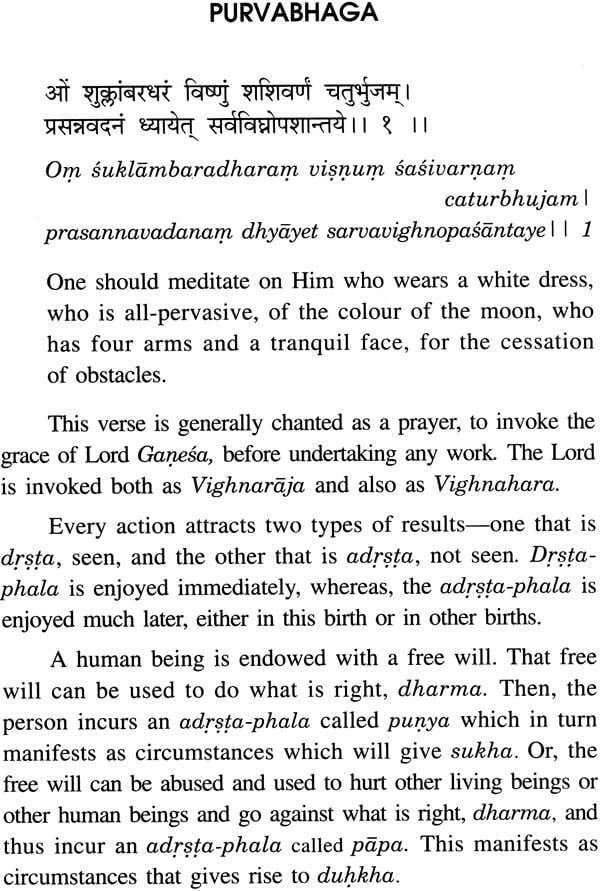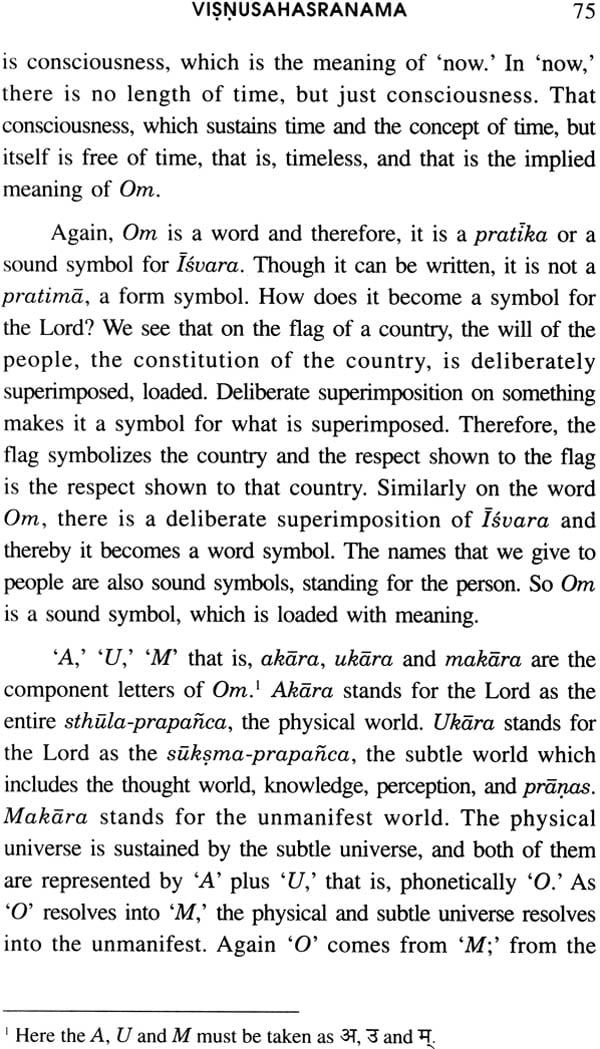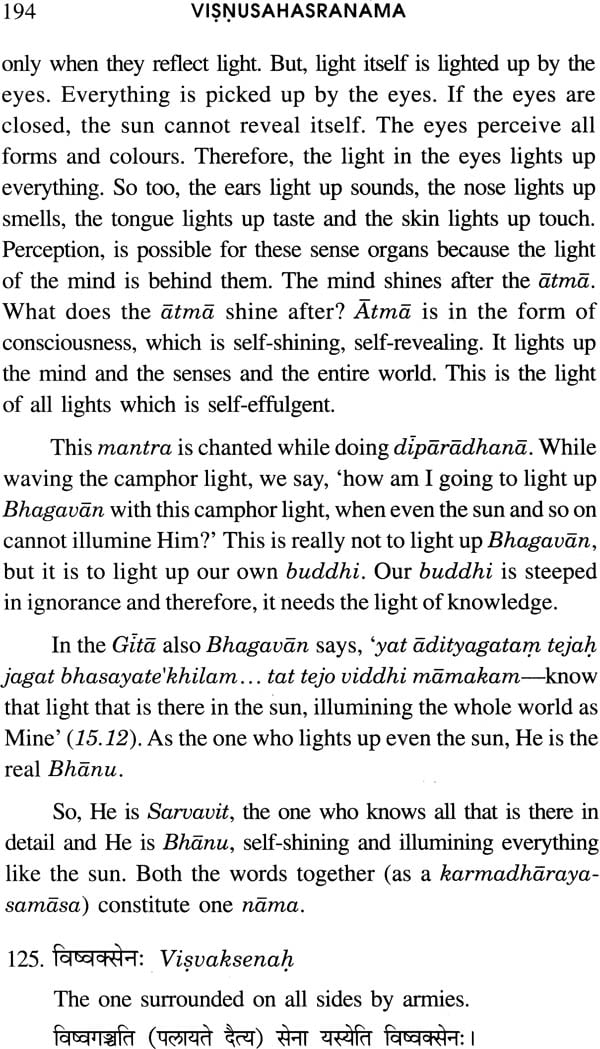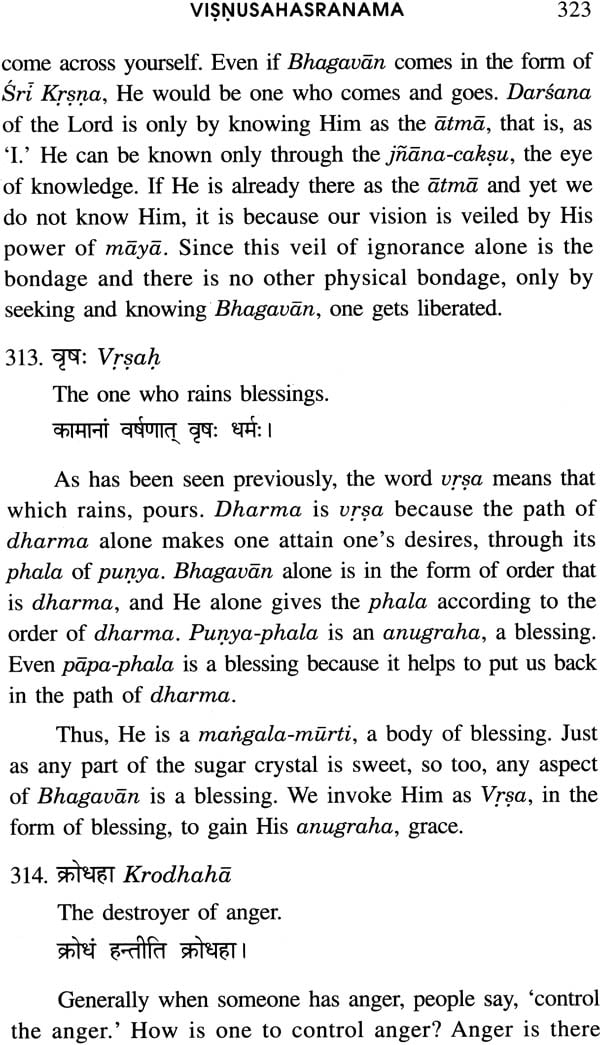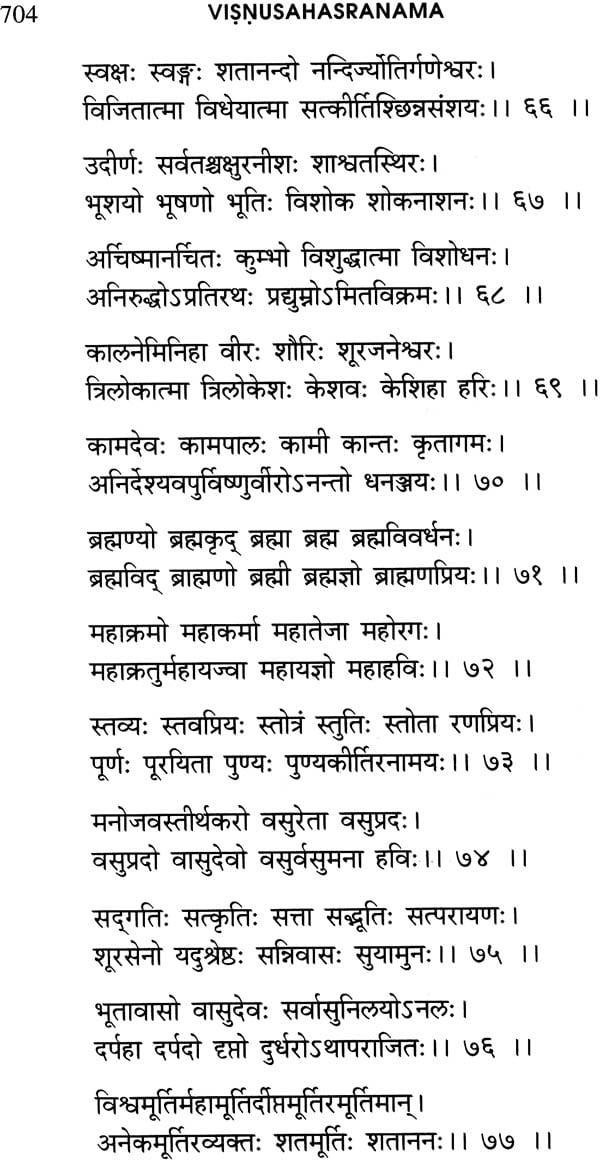
Visnusahasranama (A Detailed Commentary on the Vishnu Sahasranama)
Book Specification
| Item Code: | NAJ971 |
| Author: | Swami Dayananda Saraswati |
| Publisher: | SRUTI SEVA TRUST |
| Language: | Sanskrit Text With English Translation |
| Edition: | 2019 |
| Pages: | 724 |
| Cover: | Hardcover |
| Other Details | 8.5 inch x 5.5 inch |
| Weight | 1 kg |
Book Description
About the Author
The author, Swami Dayananda Saraswati is a renowned traditional teacher of Vedanta. He has established institutions of learning at Anaikatti (Coimbatore), Rishikesh, Nagpur and in USA. Even though his teaching is traditional, his all- comprehensive perspective of life, scholarly depth and profound knowledge, do convince us, that the classical masters are still available. There is no wonder that he has an unparalled world- wide audience.
Sri Swamiji's outstanding contributions to the cause of Vedanta, is his students. More than 250 of them today, have teaching centres and are thus carrying on the tradition of teaching all over India and the world.
Sri Swamiji has started an organisation for seva called 'All India Movement for Seva,' which is engaged in the social and welfare activities in rural and tribal India.
The Visnu Sahasranama consists of one thousand names of the Lord. Most of these names are drawn from the sruti, while the others are from the Puranas. The interpretation of these words is highly consistent with the vision of Vedanta. Sri Swamiji has clearly shown that all that is here is nothing but that one Isvara.
Foreword
I write this foreword with a sense of satisfaction. In presenting to the seekers this book of thousand names of Isvara, I feel that the Gita Home Study Teaching Programme is complete. This is so because I feel that if one reads this book along with the teaching programme to the Gita, the assimilation of the teaching of Bhagavad Gita is a certainty.
I congratulate Smt. Sunitha Santharam for undertaking this huge programme of transcribing the talks and editing them carefully with great commitment and dedication. I thank Swamini Brahmaleenananda who had gone through the manuscripts with her usual care and acumen.
May the Lord's grace continue to flow through every nama to the heart of the reader.
Preface
This book Sri Visnu-sahasranama has been compiled from the classes conducted by Pujya Sri Swami Dayananda Saraswati at Anaikatti and Rishikesh.
One of the most popular forms of prayer is chanting the Visnu- sahasranama. It is a praise of the Lord with thousand words. 'The Visnu-sahasranama does not propound a theology,' says Sri Swamiji. 'It merely talks about what is already said in the Sruti, Smrti and Puranas, It is pure advaita vedanta which says, "all that is here is only Isvara." Each of these words is a name of Isvara and when understood, becomes a window through which you look at Isvara and understand isvara with awe and wonderment.
The text is divided into three sections. 1. The Purva-bhaga, the introductory section, which talks about the background in which the Visnu-sahasranama-stotra was given by Sri Bhisma. 2. The stotra itself. 3. The Uttara-bhaga which talks about the phalasruti, the results. In the 1st and 3rd sections, the additional slokas, which are traditionally chanted, have also been included.
In the 1st and 3rd sections, each sloka is given in Sanskrit and Diacritical Roman, together with the meaning in brief. In the Stotra section, each sloka is given in Sanskrit and Diacritical Roman. Then, the nama is given in Sanskrit and Diacritical Roman, together with the meaning" in brief. Wherever the nama occurs more than once, the cross-references are given within brackets. This is followed by the relevant sentences from the bhasya of Sri Smikara and then the explanation of Pujya Sri Swamiji. Wherever a word is derived in a special way or more than in one way, an attempt has been made to point out the relevant grammar points as footnotes. Since the interpretation of the words is based on the Sastra, the relevant quotations (with their references) are given from the Gita, Upanisads and the various Puranas. A transliteration key, a list of abbreviations used, the full stotra in Sanskrit (to enable parayana) and an alphabetical index of the names have also been included.
This opportunity given to me to transcribe, edit and bring out these talks on the Visnu-sahasranama in the form of a book, I consider, is a great blessing from Lord Visnu and my Guru Pujya Sri Swami Dayananda Saraswati. My humble pranams and deep gratitude to Pujya Sri Swamiji, whose constant guidance and encouragement have helped me with this book.
I am grateful to Swamini Brahmaleenananda for her help with the Sanskrit, editing and formatting; to Swami Paramarthananda and Swami Siddhabodhananda for their guidance and help; to Smt. Usha Narayanan for the help in proof-reading and to all others who have helped in various ways.
Introduction
In our religious Indian culture, a person who constantly repeats the name of the Lord, would be looked upon as a devotee. If the person keeps repeating His name the whole day, then that person is perhaps called 'an inspired devotee.' But, when a person repeats the name of any given person the whole day, then, that person is evidently, a mentally challenged person. Therefore, there is a difference in our attitude towards these two persons. Nama is the name and nama is the one, who has the name. If the nama happens to be a time-bound person with limitations, then repeating his name will become a mere obsession and will not be beneficial in any manner. Repeating the name of a rich person and talking about his glories all the time, just because he has a lot of power and influence, will not be beneficial in any way. There is no benefit in repeating the name of a time-bound person.
But when a person repeats the name of Paramesvara, the Lord, there is bound to be a benefit, there is a purpose in it. Why should anyone repeat the names of the Lord? What are the benefits? Why has the Lord so many names? What do they mean? Thus, these questions naturally arise! There is a difference between repeating the names of the Lord with understanding and repeating them without any understanding.
UNDERSTANDING THE WORD ISVARA
All these questions become meaningful, only when we understand this Lord or Isvara. Who is Isvara? The Lord is called Isvara. The word Isvara is made up of two parts 'is' and 'vara.' The part 'vara' is called 'pratyaya' and the other part 'is' is called "prakrti;' which is in the sense of 'aisvarya,' ruling, protection; just as in the word 'worker,' 'work' is 'prakrti' and the 'er' is 'pratyaya,' So Isvara is the one who protects, sustains and the one who is a source of blessing.
In the world, we find that the work of a police commissioner is to protect others. But we see that this person, whose job is to protect others, has also his own heavy security to protect him. He also needs protection. An employer is one who is responsible for giving employment to a large number of people and His employees look upto him. But we find that this employer also looks up to a number of people and also depends on a variety of things. People like doctors, who cure people of their illnesses, also have to go to other doctors. Lawyers have to go to other lawyers and they also have to go to doctors. Doctors also have to go to lawyers, to solve their problems. A person is called a prabhu, a master, a lord. Still, when he wants to make a donation, he has to ask his wife, whether to donate or not. She may say 'I will tell you tomorrow.' Then, he has to wait. So everyone looks to someone else to make a decision. Everyone depends on others; every master has other masters to turn to; every lord is lorded over by other lords. Thus, no one seems to be a real prabhu, a real master. If this is the situation, who then is the real prabhu? The real prabhu must be the one who does not have any other prabhu. He should be the one, who is not dependent on anybody else, one who does not look up to anybody and one who is not lorded over by anybody.
In the Siva-astottara, we find 'Isvaraya namah' which means my namaskara, salutations unto the Lord. We also find another nama as 'anisvaraya namah,' The word anisvara does not mean 'one who is not a Lord' but means 'the one who does not have a Lord.' 'Isvarah na vidyate yasya' He is the Isvara and he has no Isvara to lord over him. Unto Him my salutations. The 'varac pratyaya' has the meaning of tacchilatva. When it is added to certain verbs, it gives the meaning of one who always does, habitually does what is indicated by the verb. Thus added to the verbal root 'isa aisvarye' it indicates the one who has the habit of ruling, protecting. He is always the ruler, protector and sustainer of everything. He does not need to be ruled, sustained or protected by anyone else and therefore He is Isvara.
Sri Subramaniam is called in various ways as Subbu, Subbudu, Mani and also as S. S. For all these names, one Subramaniam responds. He also responds to words of relation such as uncle, daddy, mama, anna and so on. All these are the different names for one and the same person. Now, does Isvara also have similar names? Yes. They are these thousand names and when one understands Isvara, all these names become clear.
This Isvara, who we say is the cause of this scheme of things called jagat, is to be discovered. We generally assume, without much enquiry, that there is a power beyond ourselves called God. Organizations assume and talk that there is a power and give it a location and gender as 'Father in Heaven.' He is presented as a God who is highly judgmental and cannot stand any violation of His mandates etc. So much is taken for granted that God is the most misunderstood person. Because of this, many great people like the mathematician-philosopher Bertrand Russell and others do not want to have anything to do with God or the theologies that present Him.
Some get away from such theologies while some others get along with these assumptions for want of anything better. There are some others who ask, while I have enough to worry about in my life, why should I bother with one more thing.
Contents
| Foreword | v |
| Preface | vii |
| Key to Transliteration and Pronunciation | ix |
| List of Abbreviations | x |
| Introduction | 1 |
| Purva Bhaga | 23 |
| Sahasranamavali - translation & commentary | 73 |
| Uttara-bhaga and Phalasruti | 682 |
| Visnu Sahasranama Stotra | 695 |
| Alphabetical Index to the 1000 names | 711 |
